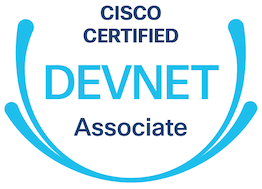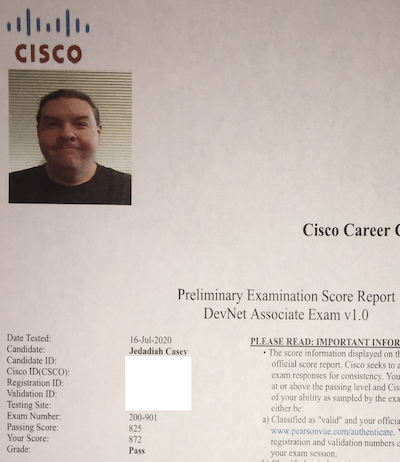Today I Passed the Cisco DevNet Associate Exam
The Cisco DevNet Associate (200-901) Exam represents a decent foundational-level body of knowledge whose importance continues to increase as the division between software development and network operations slowly erodes. A more cohesive environment is obtained when operational teams have a basic understanding of software development processes, and vice versa.

As a network engineer, I have encountered several interactions with software developers who lack an appreciation for things that are considered basic in the realm of networking. It used to be common (and maybe still is) for developers to assume infinite bandwidth with zero delay across the entire network. There’s no appreciation for the fact that a person (or process) accessing your application across a comparatively-slow WAN link from 3,000 miles away into an overloaded server in a remove datacenter is not going to receive the same user experience as the developer testing in their local environment.
Similarly, many network engineers have no appreciation for the amount of tools and processes (and meetings!) that go into a modern software development project. The need to translate business goals into codified logic while determining the best method (out of many potential options) requires stable processes and experience. Writing code is only a fraction of overall software development.
Make no mistake: if your job is within the realm of networking, this exam will not make you a software developer, nor will it turn developers into computer networking experts. This exam serves as a foundation for elements that are common to both areas in a modern information technology organization. By having a peek into each others’ knowledge base and processes, business goals are reached with increased precision and velocity.
I believe this is an important exam to study for as a network engineer who wishes to remain relevant with today’s automated network architectures. In my career as a technologist, I have grown from working on very small SOHO networks to vast global enterprise networks. There is no doubt the skills learned from studying this exam are highly beneficial for medium- and large-scale networks. However, even for small networks, learning how to interface with your devices programmatically opens up all kinds of opportunities for functional improvement and a better understanding of what’s going on in your environment.
The skills learned in the DEVASC exam can go beyond mere network automation, as well! For example, I used the fundamentals learned with this exam to create a Python script that validates information inside spreadsheets by interacting with a custom API.
If you read over my old blog posts, you’ll see that I have been dipping my toes into network automation for the past few years. Most of the work I have done has been out of self-interest—I wanted to make parts of my job easier and less time-consuming by automating certain aspects. In most cases, this had the side benefit of dramatically reducing human error, as well.
This exam served as a method to tie what I have been learning as individual pieces over time into a more comprehensive package that includes common software development tools and best practices. As a network engineer, you do not have to become a full software developer to appreciate what you will learn with this exam. Don’t get hung up on the terms “programmer” or “developer”. You are learning new tools to more efficiently solve both personal and business problems.
My study process (as it is for most certification exams) was to take the official blueprint, put it into a spreadsheet, and honestly evaluate my current understanding of each topic. For example, as an experienced network engineer, I was very comfortable with all of the topics in the ‘Network Fundamentals’ domain and did not require any study time there. Most of the remaining topics I was fairly familiar with due to my own personal experimentation over the past few years, as detailed in some of my previous posts.
For the rest, I used what I consider to be the single most invaluable resource available to study for this exam. If you’ve spent any time looking into the DEVASC exam, you probably know what I’m about to reference: Nick Russo’s absolutely amazing DevNet Associate Study Plan. This study plan is very comprehensive, and helped me solidify any missing knowledge I had within the month that I studied before attempting the exam. I no doubt passed on my first attempt due to the excellent resources provided in this comprehensive study plan.

I thought the exam itself was pretty fair, and almost all of the questions were worded well with no tricks. There were only about four questions that I left comments on saying why they could have been worded a little better or clarified. For me, by far, the most difficult questions were the ‘fill in the blank’ type. By using deductive reasoning, I am usually a pretty good test taker when it comes to multiple-choice and even drag-and-drop question types. But with many of the fill-in-the-blank questions, you really truly need to know the subject matter to get them right.
Most Cisco exams I’ve taken in the past had less than 50 questions. When I took the former CCIE Routing & Switching written exam in 2017, it had around 100 questions and felt like somewhat of a marathon for this type of exam. The DEVASC exam has a similar number of questions as the former CCIE exam, but there are not nearly as many tricky questions on the DEVASC, and many questions will take no time at all to answer if you have a solid foundation with the topics. The topic distribution is aligned with what the blueprint says (such as about 15% for Cisco Platform knowledge, for example).
Taking the exam during our current COVID-19 situation was not too bad, either. I wore a mask from the time I left my vehicle (except for 30 seconds taking this image, during which time I smiled and held my breath) to the time I returned (and used hand sanitizer as an extra precaution), but otherwise it really wasn’t a big deal at all. Cisco does offer the ability to take your exam online now with a proctor watching your every move, but I wasn’t ready for that kind of environment, yet.
Ultimately, I feel this exam was very valuable and I am glad I worked to obtain it. The fundamentals (have I used that word enough?) covered in the topic domains are valuable for both people whose primary role is networking, as well as those who write software which interacts with the network (which today is nearly all software developers).